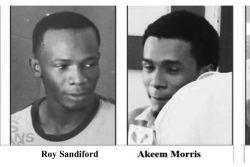Dear Editor,
If GINA’s report (SN, April 19) of Minister’s Manickchand’s address at CXC’s 40th anniversary brunch is accurate, then some of the comments attributed to the Minister ought not to remain unchallenged.
GINA has quoted the Minister as saying: “Because of equal access, because of equity across the system, because of those deliberate policies to make sure children right across Guyana irrespective of what colour you are, or how wealthy your parents are or what school you’re from and which region you’re from – you could access quality education… you have seen how that has produced over the years, top students from everywhere…”
Let me be forthright and say simply that this particular section of the minister’s address was disingenuous. This claim, most definitely, is not a true reflection of what actually obtains in the Cooperative Republic of Guyana. There is absolutely no “equal access,” or “equity across the system.” Further, the only “deliberate policy” that has been unfolding since 1992, is to make access to education increasingly subject to market forces. As a consequence the public school system continues to lose its more qualified and experienced teachers who are attracted by better benefit packages available in private schools. Access to these better-staffed private institutions is determined by one’s ability to pay – another giant step backwards from the 1992 promise of a “return to democracy.”
To reiterate: a quality education system must meet the following needs: a) the needs of individual students; b) the needs of teachers (since schools are places where teachers are expected to grow and develop professionally); c) the needs of respective school communities; and, d) the needs of the society at large (national needs).
Because of editorial constraints, I will use only criteria (a), and (d) of the above in my appraisal.
Using the last criterion (d) first, there are innumerable examples that can be used to illustrate the lack of quality in the Guyanese school system. However, I will cite only two: 1) a former Minister of Education, Dr H Jeffrey, has made an unchallenged statement to the effect that “more than half of the 18,000 students who leave school each year are functionally illiterate,” and even more recently, 2) Dr Nanda Gopaul, the current Minister of Labour is reported to have claimed that Guyanese do not possess the skills necessary to build the Marriott Hotel.
Certainly Minister Manickchand as a senior cabinet minister is aware of these statements by her colleagues. If these statements represent reality, then it must be concluded that our educational system is not meeting certain environmental, societal or national needs, and therefore the minister’s claim of “quality education” is invalid.
With regard to criterion (a) meeting the needs of individuals, our education system is again found wanting. Each individual student has multiple potentials that need to be challenged (developed) daily at school. Yet, from all reports, the indications are that after spending 11, 13 or 15 years in the school system thousands leave school annually without ever having the opportunity of knowing their true potential or worth. And at best, most of the remaining students leave school with a one-eyed view of the world.
As for the question of “equity across the system,” let us imagine on the one hand, an undernourished eleven-year-old with a host of unmet needs from a poverty-stricken and underserved area ‒ no potable water, no electricity, no all-weather roads, no reliable motor transport service, no community health facilities, poorly staffed and equipped early childhood and primary schools. And on the other hand, a healthy, and well fed eleven-year-old from either Bel Air Springs, or Pradoville 1, who has access to all the modern amenities, and who attends either Mae’s Under 12, or St Margaret’s. They both have to compete at the same time at the Levels 2, 4 and 6 Assessments for a place at one of the top secondary schools. Invariably, it is the child from the more enriched environment and the better primary school who ‘wins’ the place.
The educationally disadvantaged child who ‘loses’ (fails), and who with expert professional intervention could have been a late developer, is usually relegated to an ineffective or dead-end secondary school, unless the parent could afford to pay fees at a private institution in order to give that child a second chance. Children have absolutely no say in the choice of their parents, but our education practice penalizes the child who happens to be born to the ‘wrong’ parents. Some equity!
Recent reports cite rural schools that are screaming for teaching/learning materials. Billions more than has been allocated in the 2013 budget, need to be invested each year in purpose-built schools, and in the delivery of quality education over the medium term (the next ten years), before “equity across the system” could be even begin to be accomplished, much more fully achieved.
Further, the minister also claimed that “Guyanese students coming out on top in the CXC exams are as a result of the investments made by the government in the education sector.” Absolutely no acknowledgement or credit is given to parents who have invested lots of time and money in the provision of extra tuition for their children, or to the tutors who toiled incessantly to fulfil unmet curricular needs early every morning before school, and in the afternoons, with the possible exception of Good Friday and Xmas Day, to prepare their charges for the various CXC exams. How uncharitable.
There are more comments in the minister’s address that need to be challenged, but I will end by emphasizing that the process of education is essentially a search for ‘truth.’
Yours faithfully,
Clarence O Perry








